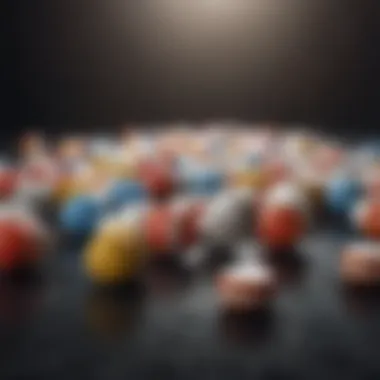Medication Treatment for Major Depressive Disorder


Intro
In the realm of mental health, Major Depressive Disorder (MDD) stands as a significant concern. This condition affects millions around the globe, casting a shadow on not only the individuals suffering but also their families, friends, and communities. When it comes to treatment, medications are often a frontline option. Delving into the medication strategies available for MDD provides invaluable insights into the complexities of this disorder.
The landscape of treatment includes various categories of medications, each with its own mechanisms of action and potential side effects. For many patients, understanding these intricacies can empower them to engage more meaningfully with their treatment plans. Beyond just the medications themselves, the role of healthcare providers, support systems, and ongoing monitoring holds equal importance in effectively managing MDD.
Furthermore, the field of pharmacotherapy is ever-evolving, with emerging trends and research continually shaping treatment paradigms. Equiping the reader with a comprehensive overview not only arms them with knowledge but also emphasizes the importance of personalized approaches to mental health care. As we navigate through this article, we aim to shed light on the essentials of medication treatments for Major Depressive Disorder.
Prelims to Major Depressive Disorder
Major Depressive Disorder, or MDD as it's often referred to, is not just a set of symptoms; it's a pervasive condition that stretches its tendrils into various facets of life. Understanding this disorder is crucial for anyone involved in mental health, be it students, researchers, or healthcare professionals. MDD brings with it a significant burden, both socially and economically, impacting the quality of life for millions and leading to profound challenges in day-to-day functioning.
Definition and Prevalence
To comprehend Major Depressive Disorder, one must first grasp what it entails. MDD is characterized by persistent feelings of sadness or a lack of interest in previously enjoyed activities. These aren't just fleeting emotions; they persist for weeks or months and can dramatically affect one’s ability to work, interact socially, and maintain personal relationships. The World Health Organization estimates that around 264 million people worldwide experience this condition, making it one of the leading causes of disability globally. The prevalence of MDD demonstrates the widespread nature of this ailment, and underscores the need for effective medication and therapy options.
Impact on Daily Life
The power of MDD to influence everyday life is immense. Imagine waking up every morning shrouded in a fog, where even the simplest tasks, like getting out of bed or doing the dishes, feel as monumental as scaling Everest. Individuals with this disorder may struggle to concentrate, feel lethargic, or be consumed with feelings of worthlessness.
The effects of a depressive episode can ripple through all aspects of living—work performance dips, social interactions dwindle, and family dynamics can become strained.
The burden on families and relationships cannot be overstated; partners may feel frustrated or helpless, children may sense their parent's withdrawal, and friendships often fade.
MDD is more than just an emotional struggle; it can lead to physical health complications, including chronic pain and sleep disorders. Tackling this condition requires a holistic approach—one that includes understanding its definition, prevalence, and the monumental impact it has on daily life. Only through such a comprehensive lens can strategies be shaped to treat and support those living with Major Depressive Disorder effectively.
Understanding Medication as a Treatment Option
When navigating the complexities of Major Depressive Disorder (MDD), it’s crucial to recognize the role of medication as one among many solutions. The landscape of depression treatment is broad and multifaceted, and understanding how medications fit into this framework can significantly improve patient outcomes. Medications often serve as a cornerstone in alleviating symptoms and fostering stability, enabling individuals to engage more fully with other therapeutic measures.
Knowing when and why to incorporate medications can address numerous concerns. For instance, those who grapple with persistent depressive symptoms while engaging in psychotherapy may find their efforts undermined by mood fluctuations. In such scenarios, medication can provide a much-needed buffer, helping to stabilize mood before diving deep into cognitive or behavioral interventions. This harmony between medication and psychotherapy can enhance overall treatment efficacy, streamlining a patient's journey toward improved well-being.
Rationale for Medication Use
The use of medications for treating MDD stems from various rationales that align with scientific insights and practical patient needs. First and foremost, the biological basis of depression, often marked by neurotransmitter imbalances, underscores the necessity for pharmacological intervention. Depression frequently presents itself not merely as a psychological condition but as a complex interplay of genetics, chemistry, and environment. For many, medication can restore a semblance of balance, aiding neurotransmitters such as serotonin and norepinephrine to foster a more stable mood.
Medications can also be particularly potent when other treatments fall short. For instance, individuals who have tried therapy without much success may find a more favorable experience through medication, illustrating how different approaches can resonate uniquely with each person. Furthermore, the urgency of alleviating severe depressive symptoms cannot be overstated. When someone is in the grips of a debilitating episode, any delay in effective treatment could worsen their condition. Here, the rapid onset of some medications can turn the tide, offering immediate relief and improving quality of life.
"The brain is like a finely-tuned instrument that can occasionally fall out of tune. Medications help to retune it, allowing for clearer expression of thoughts and emotions."
Role in the Treatment Spectrum
Delving into the spectrum of treatment for MDD reveals a broad array of options, with medication occupying a central position. It’s essential to frame medications not as standalone solutions but as integral components of a comprehensive treatment plan. Many health professionals advocate for a collaborative approach, where medication works alongside therapeutic modalities such as cognitive-behavioral therapy (CBT) and interpersonal therapy.
Integration with holistic practices can enhance the treatment scope. For instance, while medications address chemical imbalances, therapy can provide strategies for coping and understanding thoughts and behaviors associated with depressive episodes. This interconnectedness allows for a dual approach, ultimately aiming for greater resilience in the face of MDD.
Additionally, it can set the foundation for exploring newer therapies that blend both traditional and innovative treatment styles. As research continues to advance, we see increasing interest in combining medication with neuromodulation techniques or emerging pharmaceuticals that promise to alter the therapeutic landscape further.
Overall, understanding the role of medication in treating MDD is not just about prescribing pills; it’s about laying the groundwork for a healing journey tailored to individual needs and rooted in both biological and psychosocial contexts.
Types of Medications for
Understanding the various types of medications available for Major Depressive Disorder (MDD) is crucial. This section elaborates on the key categories of medications, their unique attributes, benefits, and considerations. By delving into how these medications work, we can recognize their significant role in managing symptoms and improving the quality of life for those affected by this disorder.
Antidepressants Overview
Antidepressants are the most commonly prescribed medications for MDD. They are designed to alleviate depressive symptoms by influencing brain neurotransmitters that play a crucial role in mood regulation. The primary classes of antidepressants include Selective Serotonin Reuptake Inhibitors (SSRIs), Serotonin-Norepinephrine Reuptake Inhibitors (SNRIs), Tricyclic Antidepressants (TCAs), and Monoamine Oxidase Inhibitors (MAOIs).
Selective Serotonin Reuptake Inhibitors (SSRIs)
SSRIs are widely favored due to their specific targeting of serotonin levels in the brain. This class is popular mainly because of its relatively mild side effects compared to older antidepressants. SSRIs, such as fluoxetine and sertraline, focus on blocking the reabsorption of serotonin, leading to increased availability in the synaptic gaps.
One notable feature of SSRIs is their ability to relieve depressive symptoms without the sedation that other classes may cause. This makes them suitable for various patients, especially those who struggle with fatigue and lethargy typical of MDD. However, it's important to understand that not all patients respond the same way, and some may experience side effects, which could include gastrointestinal disturbances or sexual dysfunction.
Serotonin-Norepinephrine Reuptake Inhibitors (SNRIs)
SNRIs, including medications like venlafaxine and duloxetine, offer an additional mechanism by affecting both serotonin and norepinephrine. This dual-action can provide a broader approach for enhancing mood and energy levels, which can be beneficial for patients with MDD who also present with anxiety symptoms.


The unique feature of SNRIs is their effectiveness in treating pain linked with depression, which can be an added advantage for patients dealing with co-occurring pain disorders. However, it's crucial to monitor dosage, as some individuals may experience elevated blood pressure if their doses are too high.
Tricyclic Antidepressants (TCAs)
Despite being older than SSRIs and SNRIs, TCAs like amitriptyline are still prescribed in certain cases, particularly when others have failed or when treatment-resistant depression is involved. These medications block several neurotransmitter reuptake processes, which can lead to significant mood improvement.
One of the distinct characteristics of TCAs is the potential for sedative effects, making them useful for patients who also suffer from insomnia due to their depressive state. However, the side effects can be more pronounced, such as weight gain, dry mouth, or confusion, especially in older adults, emphasizing the need for careful assessment before prescribing.
Monoamine Oxidase Inhibitors (MAOIs)
MAOIs, like phenelzine, are less commonly prescribed but can be a lifesaver for certain individuals, particularly when other treatments haven't worked. What sets MAOIs apart is their ability to irreversibly inhibit the monoamine oxidase enzyme, resulting in increased levels of mood-enhancing neurotransmitters.
Nonetheless, MAOIs require strict dietary restrictions to avoid hypertensive crises caused by consuming tyramine-rich foods. This makes them less preferable in routine treatment; however, they hold significant value in targeted cases.
Emerging Pharmacotherapies
As the field of psychological medicine continues to evolve, emerging therapies are becoming increasingly vital in the treatment of MDD. These newer pharmacotherapeutic options aim to provide alternatives for patients who do not respond well to conventional antidepressant treatments.
Ketamine and Related Compounds
Ketamine has gained attention for its rapid antidepressant effects, particularly in patients with treatment-resistant depression. The key characteristic of ketamine is its NMDA receptor antagonism, which delivers near-instant improvement in mood. Unlike traditional medications that often take weeks to show effects, ketamine can relieve symptoms in just hours.
However, this treatment is not without its concerns. There are potential side effects, such as dissociation or increases in blood pressure, and its safety for long-term use is still being researched. It's crucial for healthcare providers to weigh these factors against the potential benefits in resistant cases.
Neuromodulation Techniques
Neuromodulation techniques encompass a range of interventions such as Transcranial Magnetic Stimulation (TMS) and Electroconvulsive Therapy (ECT). These strategies employ electrical or magnetic stimulation to targeted areas of the brain, aiming to restore normal function and improve mood. For patients who may not tolerate medications well or have not found relief through traditional means, these techniques offer an innovative approach.
On the downside, treatments like ECT can be misunderstood and feared due to their invasive nature, yet for some individuals, they can provide significant relief from chronic depression.
In summary, the landscape of medications for MDD is diverse. With advancements in medicine, there’s hope for tailored treatments that address the specific needs of individuals struggling with this complex disorder.
Mechanisms of Action
Understanding how medications for Major Depressive Disorder work is crucial in grasping their potential benefits and limitations. The mechanisms of action delve into the intricate processes through which these pharmaceuticals exert their effects on the brain. Knowledge in this area can help health professionals tailor treatments more effectively and can also empower patients making informed decisions about their care.
How Antidepressants Affect the Brain
At the heart of many antidepressants’ efficacy lies their ability to alter brain function, particularly through neurotransmitter modulation. These drugs primarily target neurotransmitter systems, which play significant roles in mood regulation and emotional response.
- Increased Neurotransmitter Availability
Many antidepressants work primarily by increasing the availability of certain neurotransmitters, especially serotonin, norepinephrine, and dopamine, in the synaptic cleft. By inhibiting the reuptake process, which essentially reabsorbs neurotransmitters back into the presynaptic neuron, these medications allow for a more prolonged signaling time between neurons. This action helps improve mood and decrease depressive symptoms over time. - Neuroplasticity and Structural Changes
Studies indicate that antidepressants can also foster neurogenesis—the creation of new neurons—particularly in regions of the brain like the hippocampus. This is significant because neuroplasticity underpins the brain's ability to adapt in response to new experiences, and its enhancement through medication can play a role in recovery from depression. - Beyond Neurotransmitters
Some modern treatments, such as ketamine, act rapidly and involve different pathways. Ketamine seems to facilitate synaptic connections through the glutamate system, which differs from traditional antidepressants. This varied approach can yield quicker relief for some patients, particularly those who have not responded to conventional medications.
"Understanding these mechanisms can transform the approach patients and providers take towards managing depression."
Neurotransmitter Interactions
The role of neurotransmitters in depression is a complex tapestry woven into the fabric of how we feel and react emotionally. Medications that target these neurotransmitters can uniquely influence various aspects of depression.
- Serotonin
Often dubbed the 'feel-good' neurotransmitter, serotonin helps regulate mood, sleep, and appetite. Selective Serotonin Reuptake Inhibitors (SSRIs) specifically increase serotonin levels, which tends to elevate mood and alleviate feelings of anxiety—common co-morbidities in Major Depressive Disorder. - Norepinephrine
Another crucial player, norepinephrine, impacts alertness, energy levels, and stress response. Medications that target this neurotransmitter, especially SNRIs, can enhance overall energy and focus, combating the fatigue commonly experienced in depression. - Dopamine
Linked more closely with pleasure and reward systems, dopamine's interaction with mood can’t be overlooked. Some antidepressants, particularly those addressing treatment-resistant depression, may also interact with dopamine receptors, providing a multifaceted approach to manage the disorder.
Ultimately, appreciating how these neurotransmitters impact mental health allows healthcare providers to tailor treatment plans that suit individual patterns, thereby improving the effectiveness of the medications used. As research continues in this field, our understanding will expand, potentially leading to even more personalized and effective treatments for those suffering from Major Depressive Disorder.
Efficacy of Treatment
When examining the treatment landscape for Major Depressive Disorder (MDD), the efficacy of medications stands as a pivotal cornerstone. Understanding how well these treatments perform not only informs clinical decisions but also shapes patient expectations and outcomes. Efficacy encompasses various dimensions, including how quickly a treatment can alleviate symptoms, the degree of improvement in functionality, and its overall impact on life quality.
Clinical Outcomes and Success Rates
In the realm of MDD treatment, clinical outcomes can vary significantly across different individuals. Several studies reveal that most patients experience a degree of symptom relief within the first few weeks of starting antidepressant medications, particularly with Selective Serotonin Reuptake Inhibitors (SSRIs). It’s noteworthy that approximately 40-60% of individuals may achieve full remission with a first medication. However, these numbers can fluctuate based on factors, such as the type of medication, dosage, and individual biological responses.
Evaluating success rates involves analyzing not just numerical improvements in symptoms, but also measuring the functional recovery of patients. The goal is to ensure that individuals can engage meaningfully with their lives, work, and relationships.
"In the treatment of MDD, the efficacy of medications can often be a double-edged sword—promising relief but sometimes demanding a patient’s persistence through trial and error."
Treatment-Resistant Depression
Treatment-resistant depression (TRD) presents a challenging scenario where standard medications do not provide adequate relief. This condition affects approximately 30% of individuals diagnosed with MDD. For these patients, clinical outcomes can be frustratingly elusive, leading to an ongoing search for effective interventions.


The characteristics of TRD can vary, but common features include prolonged depressive episodes and an increased likelihood of comorbid conditions, such as anxiety disorders. Innovative strategies, such as combining medications or integrating neuromodulation techniques like Transcranial Magnetic Stimulation (TMS), are making headway in addressing TRD. The understanding here is still evolving, but early evidence suggests that personalized treatment approaches tailored to the unique presentation of each patient can yield better outcomes.
Side Effects and Considerations
Understanding the side effects and considerations associated with medication for Major Depressive Disorder (MDD) is crucial for patients and healthcare providers alike. This aspect significantly influences treatment adherence, overall patient satisfaction, and treatment effectiveness. It is essential to recognize that while medications can be life-changing for many, they are not devoid of consequences. Addressing potential side effects allows tailored patient education, which is vital in ensuring informed decision-making and fostering a supportive therapeutic relationship.
Common Side Effects
Most medications used to treat MDD, particularly antidepressants, come with a range of potential side effects. It’s vital that both prescribers and patients have a transparent discussion about these effects before starting treatment. Some common side effects include:
- Nausea and Vomiting: Many patients report gastrointestinal disturbances, especially when beginning a new medication.
- Drowsiness or Insomnia: Depending on the medication, individuals may experience sedative effects or, conversely, difficulty sleeping.
- Weight Gain or Loss: Changes in appetite can lead to significant weight fluctuations over time.
- Sexual Dysfunction: One of the more distressing side effects for many, it can impact relationships and self-esteem.
- Dry Mouth: This discomfort is often overlooked but can lead to increased dental issues over time.
It's worth noting that side effects can vary significantly from person to person. Some might breeze through with little to no issues, while others may find certain effects unbearable. Monitoring these side effects and adjusting treatment accordingly can lead to better long-term adherence.
Long-Term Risks
With longer-term medication use for MDD, additional risks come into play. The impact of chronic medication use can lead to cumulative side effects that warrant careful consideration. Here are some potential long-term risks:
- Dependency or Withdrawal Symptoms: Certain medications can lead to physical dependency, causing withdrawal symptoms if treatment is stopped suddenly.
- Cognitive Impairment: Prolonged use of some antidepressants has been linked to memory issues or cognitive decline.
- Increased Risk of Other Health Issues: For example, SSRIs may be associated with an elevated risk of gastrointestinal bleeding, especially when used with non-steroidal anti-inflammatory drugs (NSAIDs).
- Metabolic Changes: Long-term usage of some mood stabilizers and atypical antipsychotics can lead to metabolic syndrome, which includes a combination of increased blood pressure, high blood sugar, excess body fat around the waist, and abnormal cholesterol levels.
Understanding these risks is paramount for a sustainable approach to MDD treatment. As new therapies and insights emerge, ongoing dialogue about the balance of risks and benefits should be the standard practice in mental health treatment.
"In medication management for Major Depressive Disorder, knowing the potential side effects and long-term risks helps tailor a more effective treatment strategy that prioritizes patient safety and well-being."
Personalizing Treatment Plans
Personalizing treatment plans is a critical component in effectively managing Major Depressive Disorder (MDD). This approach tailors the medication strategies to the unique needs and circumstances of each patient, moving away from a one-size-fits-all model. As we explore this subject, we will look at how a personalized plan can enhance treatment outcomes, foster better patient engagement, and ultimately lead to a more successful management of depression.
Importance of Individual Assessment
Individual assessment is the bedrock of a personalized treatment plan. It goes beyond simply understanding the symptoms of depression; it involves a comprehensive evaluation of the whole person. Through thorough clinical interviews, psychometric testing, and consultation with family members, healthcare providers can develop a nuanced picture of the individual’s mental health. This in-depth assessment helps identify the severity of the disorder, any comorbid conditions, and the social and environmental factors contributing to their situation.
Such personalized insights allow for a more focused and effective prescription of medications, which can facilitate a smoother recovery process and the reduction of trial and error often associated with antidepressant treatments.
Factors Influencing Medication Choice
When it comes to selecting the right medication for MDD, several factors come into play. Each factor can significantly influence how effective a treatment will be, making the personalization of medication choice extremely pertinent.
Patient History
Patient history sheds light on the individual's past experiences with mental health, including previous treatments and their outcomes. For instance, if a patient has had a positive response to a certain class of antidepressants in the past, a clinician may prioritize those again. Moreover, understanding family psychiatric history becomes invaluable. A person whose family has a history of depression may be more predisposed to similar conditions, pointing toward a possible need for preemptive measures. The key characteristic here is that patient history serves as a guide, helping clinicians to create an effective treatment strategy that resonates with the patient's unique journey. However, the downside is that previous negative experiences with medications could foster a reluctance to try new options, potentially extending the duration of treatment resistance.
Genetics
Genetics play a pivotal role in determining how an individual might respond to various depressive treatments. Certain genetic markers can make some patients more susceptible to side effects from specific medications while others might metabolize them too quickly or slowly. By assessing genetic factors, like variations in the CYP450 gene family, healthcare providers can fine-tune their medication choices, improving the likelihood of a favorable response. This aspect of treatment personalization is becoming increasingly beneficial due to the rise of pharmacogenomic testing, which allows for a more precise alignment of treatment choices. However, its implementation can be a bit daunting for both patients and practitioners due to costs and accessibility.
Lifestyle Considerations
Lifestyle considerations often get overlooked in clinical assessments but are integral to successful treatment. Factors such as diet, exercise, sleep patterns, and social support can have profound effects on mental health. For instance, a sedentary lifestyle or poor nutrition may exacerbate depressive symptoms, while routine exercise may mitigate them.
Addressing these lifestyle considerations opens up an opportunity for holistic treatment plans that pair medications with lifestyle modifications. Choosing this route can lead to not only better overall health outcomes but also to effective management of depressive symptoms long-term. However, the challenge lies in modifying ingrained habits, which often requires consistent support and motivation.
“A personalized approach to treatment not only enhances the chances of recovery but also helps build the trust necessary for a productive therapeutic relationship.”
In summary, personalizing treatment plans in the context of Major Depressive Disorder fundamentally acknowledges the diverse realities of each patient. Factors such as individual assessment, patient history, genetics, and lifestyle considerations collectively create a tailored framework aimed at optimizing treatment efficacy. This approach is essential in fostering sustainable improvement in mental health outcomes for those facing the challenges of depression.
Role of Healthcare Providers
The role of healthcare providers in the treatment of Major Depressive Disorder (MDD) cannot be overstated. These professionals serve as the backbone of mental health care, guiding patients through the muddled waters of depression treatment. Their responsibilities encompass a wide range of activities, from diagnosing the disorder to providing ongoing support during medication management. When treated properly, healthcare providers can significantly improve patient outcomes by ensuring a tailored approach that considers the nuances of each individual’s experience with depression.
Psychiatrists and Prescribing Practices
Psychiatrists play a pivotal role in diagnosing and treating MDD. They possess specialized training that enables them to evaluate complex mental health issues and develop effective medication regimens. A psychiatrist’s methodical approach not only relies on established guidelines but also takes into account the unique aspects of each patient’s life. This includes their medical history, family background, and any other mental health conditions they may have.
These professionals also focus on the necessity of informed consent. Patients should understand why particular medications are being prescribed, what to expect, and potential side effects. This transparency builds trust and fosters a collaborative dialogue, allowing patients to express their concerns openly.
Additionally, the prescribing practices of psychiatrists are dynamic. They often have to tweak medication types and dosages based on patient feedback and the emerging evidence on drug efficacy. This adaptability is essential in navigating the often-uncertain landscape of MDD treatment, where a ‘one-size-fits-all’ approach simply does not work.
The Importance of Monitoring
Monitoring a patient's progress during treatment is as crucial as the initial prescription. Regular check-ups and assessments help healthcare providers gauge how well the medication is performing and if any adjustments are necessary.


Regular monitoring not only identifies side effects but also helps in understanding the overall effectiveness of the treatment plan.
Some vital aspects of monitoring include:
- Symptom Tracking: Healthcare providers often ask patients to report changes in their mood, energy levels, and daily functioning. These indicators assist in determining whether the treatment is on the right track.
- Side Effects Management: Not every patient will respond well to a prescribed medication. Regular follow-ups can help identify any adverse reactions early on, allowing for timely adjustments to the treatment plan.
- Collaborative Decision-Making: Monitoring sessions serve as a platform for collaborative decision-making, encouraging patients to be active participants in their recovery process. This engagement often leads to a sense of ownership over the treatment journey.
- Long-Term Strategy: For many individuals, MDD is a chronic issue requiring ongoing management. Regular monitoring lays the foundation for long-term success by helping to establish a comprehensive care strategy that goes beyond merely managing symptoms.
In summary, healthcare providers, particularly psychiatrists, are integral to the management of Major Depressive Disorder. Their commitment to personalized care through thoughtful prescribing practices and diligent monitoring can make all the difference in a patient's recovery journey.
Integration with Psychotherapy
When discussing medication treatment for Major Depressive Disorder, the integration with psychotherapy emerges as a crucial element in the recovery journey. While medications can help alleviate the symptoms of depression, they often work best when paired with therapeutic practices. This synergy not only enhances the overall treatment efficacy but also addresses the multifaceted nature of depression, which often includes psychological, emotional, and situational components.
Complementary Approaches to Treatment
Incorporating psychotherapy as part of a comprehensive treatment plan offers numerous benefits. First, it provides individuals with a structured environment to explore their thoughts and emotions, fostering a deeper understanding of their condition. Cognitive Behavioral Therapy (CBT) and interpersonal therapy are particularly effective. They can empower patients to identify negative thought patterns and develop coping mechanisms. Additionally, therapy sessions may reveal underlying issues, such as unresolved trauma or chronic stress, which can exacerbate depressive symptoms.
Key advantages of merging medication with psychotherapy include:
- Holistic Recovery: Medication can address biological factors, but therapy tackles emotional and cognitive aspects.
- Skill Development: Patients acquire practical skills to manage their mental health, encouraging long-term resilience.
- Improved Adherence: Patients engaged in therapy are often more committed to their medication routines.
"Integrating medication and psychotherapy not only treats symptoms effectively but also addresses the root causes of distress."
This holistic approach also allows for a supportive environment, where therapists can monitor medication effects, manage side effects, and adjust treatment plans accordingly. Sometimes, the therapeutic dialogue can lead to insights that inform better medication choices, tailoring strategies to suit individual circumstances.
Collaborative Care Models
The concept of collaborative care models has gained traction in recent years, emphasizing a team-based approach to treating Major Depressive Disorder. In these models, primary care providers, psychiatrists, therapists, and even the patients themselves form a cohesive unit. This can blur the traditional boundaries of care, facilitating more communication and comprehensive treatment strategies.
Advantages of fostered collaboration include:
- Shared Decision-Making: Patients feel more involved in their treatment plans and are likely to stay engaged.
- Continuity of Care: Regular check-ins and evaluations help ensure that treatment remains effective.
- Resource Optimization: By leveraging multiple skill sets, patients receive balanced support tailored to their individual needs.
Incorporating psychotherapy into this model allows for flexibility in treatment approaches. For example, while a psychiatrist focuses on medication management, a therapist can tackle the interpersonal skills that might be affecting the patient’s mental health. When healthcare providers work closely together, it allows for more accurate and timely adjustments to treatment, ultimately enhancing the chances of a successful outcome in managing Major Depressive Disorder.
Future Directions in Treatment
The landscape of treating Major Depressive Disorder is continually evolving. It is increasingly recognized that to make strides in alleviating the burden of this complex condition, the focus must shift towards innovative research and novel therapeutic approaches. The subject of future directions in MDD treatment is vital within this article as it not only highlights current trends but also envisions how treatment methodologies might transform in the years ahead.
Research Trends and Innovations
In the realm of mental health, the importance of research cannot be overstated. New avenues for understanding the biological underpinnings of depression are emerging, which in turn influences drug development.
- Biomarkers in Treatment Response: There is growing interest in identifying biomarkers that may predict how a patient will respond to specific treatments. This could revolutionize personalization of therapy, enabling tailored approaches based on individual biology.
- Psychobiotics: The connection between gut health and mental health is being increasingly explored. Psychobiotics, a new category of probiotics, could potentially play a role in how mood and cognition are regulated. Early studies hint that these organisms might lift the depressive symptoms by influencing neurotransmitter production.
- Digital Therapeutics: With the rise of technology, digital therapies are gaining traction. These include mobile apps and online platforms that provide behavioral interventions. Their scalability and accessibility hold the promise for reaching populations that traditional therapy has often neglected.
"The integration of technology into mental health treatment offers a unique opportunity to reach individuals in need, potentially changing lives without the confines of office appointments."
Potential New Therapies on the Horizon
Innovations in pharmacotherapy are at the forefront of reshaping how we approach the treatment of MDD. Several potential new therapies are being investigated that could complement or even replace conventional antidepressants.
- Glutamatergic Modulation: Ketamine has garnered attention as a fast-acting antidepressant. Research is now expanding into other glutamatergic agents, which may provide quicker relief for depressive symptoms with a potentially different side effect profile than traditional medications.
- Psychedelics: Substances like psilocybin and MDMA are experiencing a resurgence in clinical investigations for their therapeutic potential in treating depression. The results so far suggest that these substances could foster significant and lasting improvement in mood by promoting neuroplasticity and emotional processing.
- Gene Therapy: Though still in infancy, the concept of gene therapy for MDD holds fascinating prospects. If researchers can identify specific genetic triggers for depressive episodes, it might be possible to correct these at the genomic level.
The future of MDD treatment is not just about making current treatments more effective; it is about broadening our understanding of depression and drawing on interdisciplinary approaches to identify new methodologies that work. The dialogue surrounding these emerging trends and potential therapies is vital, as it sets the stage for a more nuanced and comprehensive attack on Major Depressive Disorder.
Culmination
The conclusion serves as a pivotal section in understanding the complexities surrounding the treatment of Major Depressive Disorder (MDD) through medication. Compiling various elements discussed throughout the article, it encapsulates the ongoing challenges faced by both patients and healthcare providers alike.
The Ongoing Challenge of Treatment
MDD poses a significant burden not just on individuals but also on families and communities. The treatment landscape is intricate; effectiveness can vary widely between patients, and often the first few medications tried do not yield satisfactory results. Factors contributing to this variability include genetic predisposition, the nature of the depressive episode, and individual behavioral patterns.
Moreover, the chronic nature of depression means that individuals may find themselves in cycles of remission and relapse, creating a necessity for long-term treatment strategies. Patients frequently face the daunting task of managing side effects, which can deter consistent medication adherence and complicate treatment trajectories.
Healthcare providers, while armed with clinical knowledge, often grapple with the limitations of current pharmacotherapies. The lingering stigma around mental health and the fear of medication can also prevent individuals from seeking help. Educating patients about the nature of medication and its role as one piece in a broader treatment puzzle is essential for fostering an environment of trust and encouraging adherence.
Promoting Awareness and Understanding
Promoting awareness surrounding MDD and its treatment options is crucial. It can lead to earlier interventions, improved treatment compliance, and, ultimately, better outcomes for those struggling with depression. While medication is often highlighted, it's important to recognize it as a component of a more comprehensive approach that includes therapy, lifestyle changes, and support networks.
Laypersons and medical professionals alike can benefit from educating themselves about MDD’s complexities and the diverse range of treatments available. This understanding can facilitate informed discussions about care pathways, allowing for shared decision-making between patients and healthcare providers.
The journey of treating Major Depressive Disorder requires collaboration and continual reassessment, bringing to light the necessity for ongoing research and patient education.
Encouraging an open dialogue about MDD can demystify treatment processes and create a supportive atmosphere for those affected. As we strive for a more inclusive understanding of mental health, recognizing the value of empathy and shared experiences can lead to transformative shifts in how society approaches depression and its treatment.



